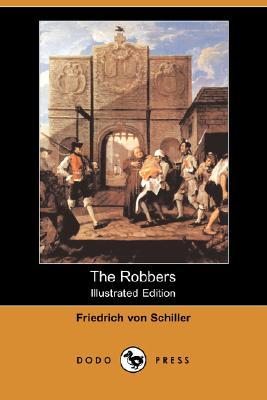
‘The Robbers’ by Friedrich Schiller was first published in 1781. Is it the earliest German book that I have ever read? Possibly. I first got to know about it when I read the book ‘German Literature : A Very Short Introduction’ by Nicholas Boyle. This is what Boyle says about Schiller’s play :
“a rebellious schoolboy in Stuttgart, Friedrich Schiller, began drafting the definitive treatment of the theme, his first play, ‘The Robbers’, which took the reading public by storm on its publication in 1781, and reduced its audience to sobs and swoons when it was first performed the following year.”
“A modern, international audience can still be gripped by the story of Karl and his band, a prescient analysis of the logic of self-righteous terrorism in a moral void. The huge success of the play in Germany in its own time and subsequently was no doubt due to the ferocity with which it dramatized the conflict between the two value systems available to the middle class in its struggle against princely rule – self-interested materialism or university-educated idealism – while it left prudently unassailed the structure of power itself.”
“…Schiller focussed, with the penetrating clarity of a born dramatist, on the political and moral fault-lines in his contemporary society. With ‘The Robbers’ an independent modern German literary tradition begins.”
How can you resist a description like that? Since I read that, I have wanted to read ‘The Robbers’. I managed to squeeze it in yesterday, on the last day of this year’s German Literature Month. Here is what I think.

‘The Robbers’ is about two brothers Karl and Franz. Karl is the eldest son and so is the natural heir to his father’s estates. Their father loves Karl. Everyone does. Karl is also engaged to a beautiful woman called Amalia. Franz resents this. He resents everything that Karl has, but which he desires. He covets his father’s name and estates. He wants to win the hand of Amalia. So, he plots against Karl. Karl himself seems to aid that venture. While he is away from home, he gets into debt and runs away from the law. Franz uses that and convinces his father to disinherit Karl. Karl has plans of coming back home and hopes that his father will forgive him for his indiscretions. But when he receives the letter from his brother Franz stating that his father has disinherited him, he is hurt and angry. And before he knows what he is doing, he joins with his companions and starts a band of robbers and becomes a fugitive who is hunted by the law. Franz meanwhile continues with his nefarious plots – he wants his father, the elderly Count, to die, so that he can take over the estates, but the Count, eventhough feeble, has a sound constitution. Using psychological threats and false news that his son Karl has died in a battle, Franz upsets the Count immeasurably that the Count dies in a shock. Franz takes over his father’s name and estates. The household staff serves him loyally. However, his plans to win Amalia come to naught. Amalia spurns his advances and decides to be faithful to her supposedly dead fiancé Karl. Meanwhile, Karl, as the head of his band of robbers, has adventures that robbers have. He saves one of his band members from near certain death and while saving him, burns down the whole town. Karl, though he is a robber, is noble. He doesn’t want any money for himself and helps poor people in need. He is a robber – he kills, he burns – but he is also kind. One day he hears some news about Amalia and comes to his father’s castle in disguise. There he discovers the truth about how Franz was responsible for his father’s death and how Franz usurped his rightful inheritance. Karl is wild with anger
What happens next? Does Karl exact revenge? What happens to Franz? Does he reach the end that is reserved for all villains? Do Karl and Amalia get married? What happens to the band of robbers? The answers to these questions form the rest of the story.
There were many things that I liked about ‘The Robbers’. The first thing I liked was the way the characters of Karl and Franz were portrayed. Karl, though he is the noble hero, is also a robber. Schiller doesn’t shy away from portraying that part of Karl’s personality. Karl robs people, kills them, burns houses and towns. Schiller doesn’t condone that. So, we see two sides of Karl – the noble kind side and the ruthless robber side. Karl is not a traditional, hero, but a complex character. Franz, the villain, is quite complex too. He is an atheist and a materialist. Though I didn’t like him much – it is hard to like a villain – I loved many of the lines that he spoke. They were insightful and profound. My favourite lines were a soliloquy by him :
Francis (soliloquy) : “…he is thy father! He gave thee life, thou art his flesh and blood – and therefore he must be sacred to thee! Again a most inconsequential deduction! I should like to know why he begot me; certainly not out of love for me – for I must first have existed.”
“Could he know me before I had being, or did he think of me during my begetting? Or did he wish for me at the moment? Did he know what I should be? If so I would not advise him to acknowledge it or I should pay him off for his feat. Am I to be thankful to him that I am a man? As little as I should have had a right to blame him if he had made me a woman. Can I acknowledge an affection which is not based on any personal regard? Could personal regard be present before the existence of its object? In what, then consists the sacredness of paternity?”
“Is it in the act itself out of which existence arose? As though this were aught else than an animal process to appease animal desires. Or does it lie, perhaps, in the result of this act, which is nothing more after all than one of iron necessity, and which men would gladly dispense with, were it not at the cost of flesh and blood? Do I then owe him thanks for his affection? Why, what is it but a piece of vanity, the besetting sin of the artist who admires his own works, however hideous they may be? Look you, this is the whole juggle wrapped up in a mystic veil to work on our fears. And, shall I, too be fooled like an infant?”
It made me remember those famous lines from ‘Paradise Lost’ which Mary Shelley quotes in the first pages of ‘Frankenstein’ – “Did I request thee maker, from my clay, to mould me man? Did I solicit thee from darkness to promote me?”
Franz was a villain, but he was also intelligent, smart and philosophical, like the best of them are.
The next passage is probably spoiler-ish, and so if you are planning to read the play, please be sufficiently forewarned.
One more thing I liked about the story was the internal conflict that Karl undergoes towards the end of the story, when he has to choose between his band of robbers who have sworn loyalty to him and his sweetheart Amalia. I have seen this scene in countless movies, but I think Schiller probably was the first to write this scene. So three cheers to him.
There were two surprises at the end of the story. One of them was unexpected but in a nice way. The second one was also unexpected but it was not-so-nice and I felt that it was not required. It just had shock value and I was upset with Schiller for doing that – upset in the way an anonymous twenty-first century reader can be upset at a legendary German playwright who lived more than two hundred years earlier, an affectionate anger which stretches across time and the centuries.
The ending of the story is interesting – not the regular good-guys-win-and-the-bad-guys-die kind of ending, but one which is more complex than that.
One word on the translation. One of the things I hated about the translation I read was that Karl was called ‘Charles’ and Franz was called ‘Francis’. Really? Is that anglification of characters’ names really necessary? What were you thinking, my dear Mr.Translator??
I enjoyed reading ‘The Robbers’. I am happy that I have finally been able to read one of the great landmark plays of German literature. By that born dramatist of penetrating clarity, Friedrich Schiller 🙂 I would like to read some of his poems and his essays on aesthetics some day.
I will leave you with one of my favourite passages from the play. This one is spoken by Karl to Schwarz, one of his robber companions.
Karl (to Schwarz) : “Why should man prosper in that which he has in common with the ant, while he fails in that which places him on a level with the gods. Or is this the aim and limit of his destiny?”
“Brother, I have looked at men, their insect cares and their giant projects, – their god-like plans and mouse-like occupations, their intensely eager race after happiness – one trusting to the fleetness of his horse, – another to the nose of his ass, – a third to his own legs; this checkered lottery of life, in which so many stake their innocence and their leaven to snatch a prize, and, – blanks are all they draw – for they find, too late, that there was no prize in the wheel. It is a drama, brother, enough to bring tears into your eyes, while it shakes your side with laughter.”
Have you read Schiller’s ‘The Robbers’? What do you think about it?
Read Full Post »











